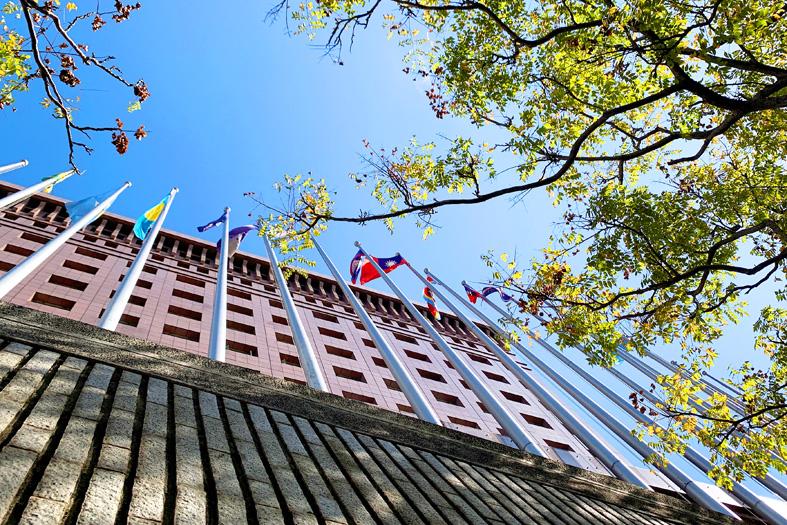The Nicaraguan government has given the staff of Taiwan’s embassy two weeks to depart, after Managua severed diplomatic ties with Taipei on Friday last week, the Ministry of Foreign Affairs (MOFA) said on Wednesday.
The decision for Taiwanese staff to depart before Thursday next week was arrived at during negotiations between the two sides in the wake of the diplomatic split, and, based on the principle of reciprocity, the Taiwanese government requested that the staff of Nicaragua’s embassy in Taipei leave by the same deadline, ministry spokeswoman Joanne Ou (歐江安) said.
Taiwan’s embassy in Managua is preparing to close, and staff members and their families — a total of 52 people — would depart in stages, Ou confirmed, after La Prensa newspaper in Nicaragua had reported about the departure the previous day.

Photo: Sarah Wu, Reuters
It is customary for countries to take at least a month to recall their respective personnel following a severing of diplomatic ties, a diplomatic source said.
La Prensa reported that the Nicaraguan National Assembly on Tuesday repealed a bilateral free-trade agreement (FTA) with Taiwan, which had been signed in December 2006.
Earlier on Tuesday, the Ministry of Economic Affairs had said that the FTA would remain in effect, despite formal ties being severed.
On Wednesday, the ministry said that either side could withdraw from the FTA by giving six months’ notice, although Nicaragua had not yet notified Taiwan.
On Tuesday, Nicaraguan lawmakers also repealed seven other agreements with Taiwan, including a US$20.2 million loan signed in 1998 with the Export-Import Bank of the Republic of China to finance an irrigation project in western Nicaragua, La Prensa reported.
With the loss of Nicaragua, Taiwan has 14 diplomatic allies.

Taiwan has received more than US$70 million in royalties as of the end of last year from developing the F-16V jet as countries worldwide purchase or upgrade to this popular model, government and military officials said on Saturday. Taiwan funded the development of the F-16V jet and ended up the sole investor as other countries withdrew from the program. Now the F-16V is increasingly popular and countries must pay Taiwan a percentage in royalties when they purchase new F-16V aircraft or upgrade older F-16 models. The next five years are expected to be the peak for these royalties, with Taiwan potentially earning

STAY IN YOUR LANE: As the US and Israel attack Iran, the ministry has warned China not to overstep by including Taiwanese citizens in its evacuation orders The Ministry of Foreign Affairs (MOFA) yesterday rebuked a statement by China’s embassy in Israel that it would evacuate Taiwanese holders of Chinese travel documents from Israel amid the latter’s escalating conflict with Iran. Tensions have risen across the Middle East in the wake of US and Israeli airstrikes on Iran beginning Saturday. China subsequently issued an evacuation notice for its citizens. In a news release, the Chinese embassy in Israel said holders of “Taiwan compatriot permits (台胞證)” issued to Taiwanese nationals by Chinese authorities for travel to China — could register for evacuation to Egypt. In Taipei, the ministry yesterday said Taiwan

Taiwan is awaiting official notification from the US regarding the status of the Agreement on Reciprocal Trade (ART) after the US Supreme Court ruled US President Donald Trump's global tariffs unconstitutional. Speaking to reporters before a legislative hearing today, Premier Cho Jung-tai (卓榮泰) said that Taiwan's negotiation team remains focused on ensuring that the bilateral trade deal remains intact despite the legal challenge to Trump's tariff policy. "The US has pledged to notify its trade partners once the subsequent administrative and legal processes are finalized, and that certainly includes Taiwan," Cho said when asked about opposition parties’ doubts that the ART was

If China chose to invade Taiwan tomorrow, it would only have to sever three undersea fiber-optic cable clusters to cause a data blackout, Jason Hsu (許毓仁), a senior fellow at the Hudson Institute and former Chinese Nationalist Party (KMT) legislator, told a US security panel yesterday. In a Taiwan contingency, cable disruption would be one of the earliest preinvasion actions and the signal that escalation had begun, he said, adding that Taiwan’s current cable repair capabilities are insufficient. The US-China Economic and Security Review Commission (USCC) yesterday held a hearing on US-China Competition Under the Sea, with Hsu speaking on